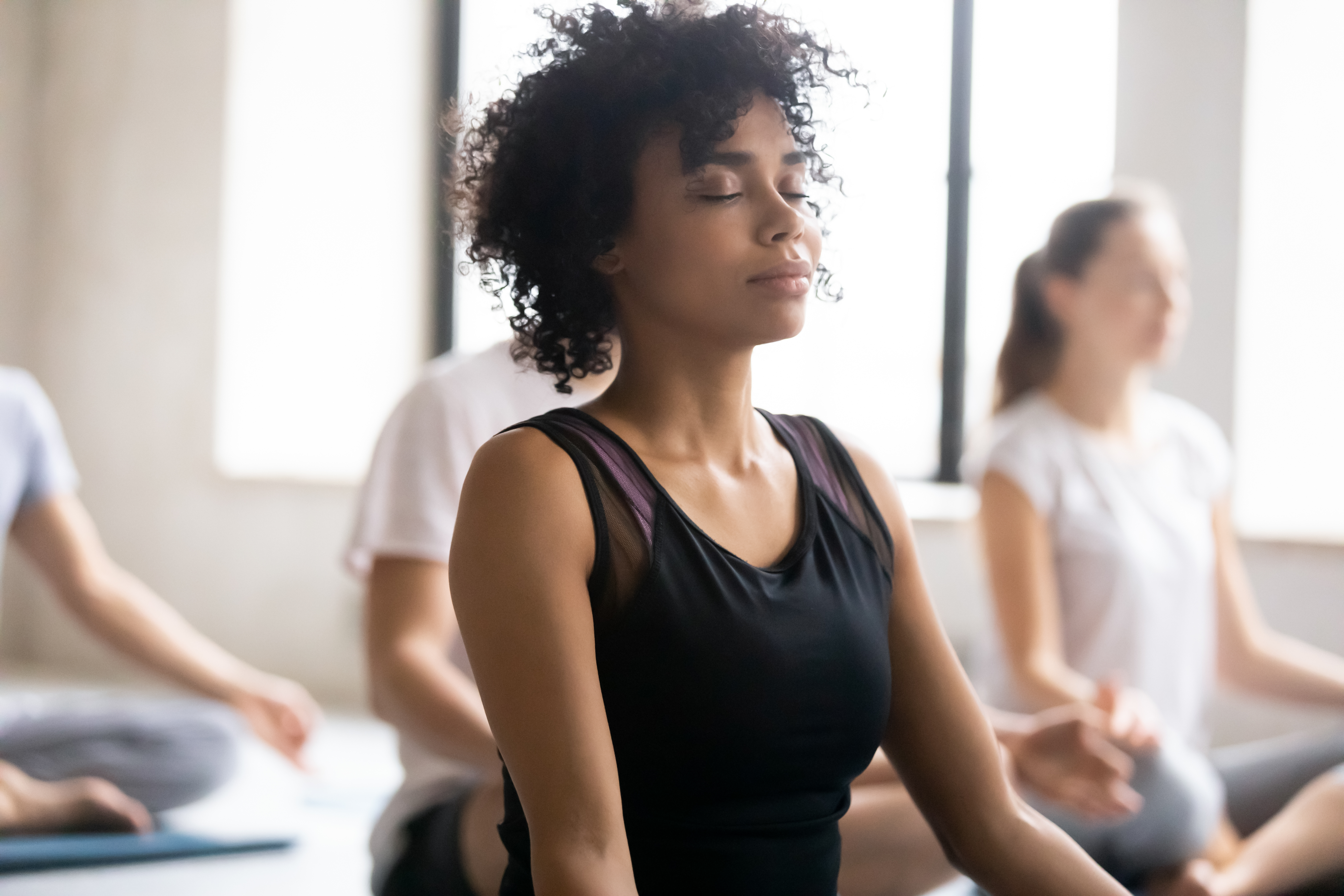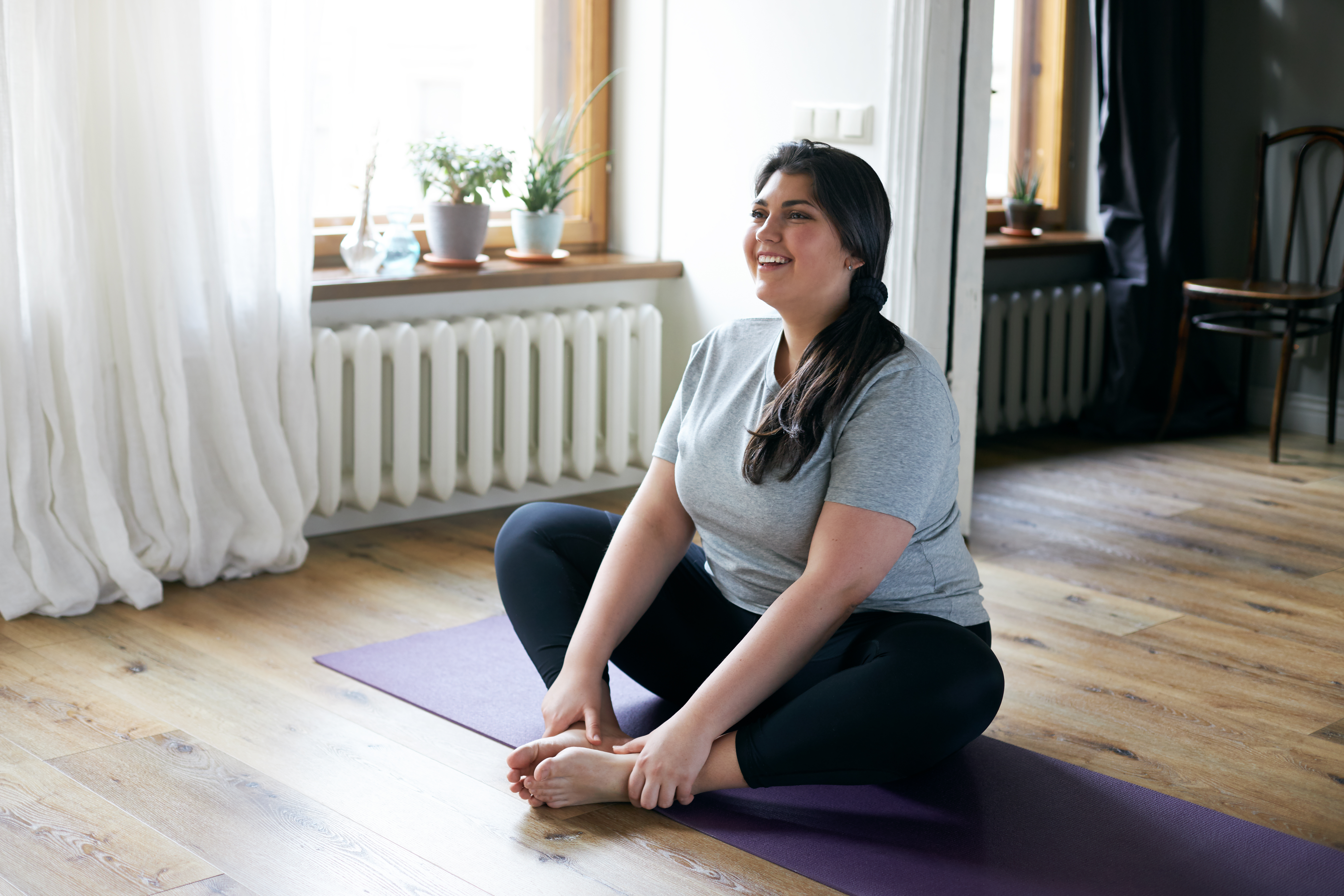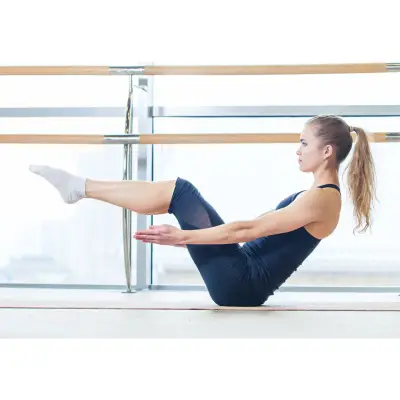Yoga, a practice rich in history and depth, offers many mental health benefits. This article explores the top seven benefits, explaining how each aspect of yoga contributes to a healthier, more balanced state of mind.
Jump to:
Recommended for you!
Best SellersWhat is Yoga for Mental Health?
Yoga for mental health is an integrative practice that combines physical poses, controlled breathing, and meditation to enhance psychological well-being. It helps in reducing stress, anxiety, and depression while fostering mindfulness, emotional balance, and a heightened sense of self-awareness. This holistic approach makes yoga a valuable tool for maintaining and improving mental health.
1. Enhances Mindfulness

Yoga is a powerful tool for enhancing mindfulness, an essential aspect of mental well-being. This practice guides you to focus on the present moment, drawing your attention away from the distractions and stresses of daily life.
- Present-Moment Awareness
In a typical yoga session, you're encouraged to concentrate on your breathing and the alignment of your body. This focus on the breath and physical sensations serves as a grounding technique, helping to anchor you in the present. It's a practice that teaches you to observe your moment-to-moment experiences without judgment.
- Increased Awareness of Thoughts and Emotions
As you become more attuned to your breath and body through yoga, you also become more aware of your thoughts and emotions. Yoga provides a space to observe your mental patterns, essential for managing stress and anxiety. By recognising your habitual thought patterns, you can detach from negative or unhelpful thoughts, seeing them as fleeting occurrences rather than defining aspects of your identity.
- Connecting Body and Mind
Mindful yoga practices create a deep connection between the body and the mind. As you move through various yoga poses, you learn to listen to your body, understanding its limits and capabilities.
- The Role of Breath in Mindfulness
Breathwork, or pranayama, is a key element in mindful yoga. Deep, controlled breathing activates the parasympathetic nervous system, promoting relaxation and a sense of calm. Focusing on your breathing can control your body's response to stress, resulting in better mental health.
- Mindful Yoga: A Practice for Everyone
Mindful yoga is accessible to everyone, regardless of their experience with yoga or meditation. It's a practice that can be incorporated into daily life, even outside the yoga mat. Simple mindfulness exercises like mindful breathing or body scans can be done anywhere, helping you bring the calming effects of yoga into every aspect of your day.
2. Reduces Stress and Anxiety

- Relaxation Techniques in Yoga
Yoga incorporates various relaxation techniques that help in calming the mind. Practices such as guided imagery, progressive muscle relaxation, and mindfulness meditation are often integrated into yoga sessions. These techniques encourage a state of restfulness, significantly reducing the body's stress response.
- Yoga Poses for Stress Relief
Certain yoga poses, or asanas, are particularly effective in reducing stress and anxiety. For example, poses like Child's Pose, Forward Fold, and Legs-Up-The-Wall are known for their calming effects. These poses help release tension from the body, particularly in areas where stress tends to accumulate, like the neck, shoulders, and back.
- The Role of Meditation in Yoga
Meditation, an integral part of most yoga practices, also reduces stress and anxiety. It teaches you to focus your mind, bringing your attention away from chaotic thoughts and worries.
- Building Resilience to Stress
Regular yoga practice helps build stress resilience over time. As you become more adept in yoga techniques, you develop a toolkit to turn to in stressful situations. This resilience is key to maintaining long-term mental health and well-being.
3. Improves Concentration and Focus

Regular yoga practice enhances concentration and focus. This improvement is largely attributed to mindfulness, which trains the mind to stay anchored in the present moment.
- Enhancing Cognitive Functions
Yoga's impact on concentration and focus extends to broader cognitive functions. Regular practice has been shown to improve memory, intuition, and decision-making skills. These cognitive benefits come from yoga's ability to reduce mental clutter and increase brain function efficiency.
- Yoga and Attention Span
Maintaining a healthy attention span in our fast-paced, distraction-filled world is challenging. Yoga offers a respite from constant distractions, allowing you to practice and extend your ability to focus. Over time, this practice can significantly improve your attention span, making it easier for you to concentrate on tasks for longer without getting distracted.
- Stress Reduction and Improved Focus
Stress is a common culprit behind poor concentration and scattered thoughts. Yoga's ability to reduce stress contributes to better focus. As stress levels decrease, the mind becomes calmer and more capable of concentrated thought.
4. Boosts Mood and Emotional Balance

Yoga is a powerful mood enhancer. By engaging in regular yoga practice, you can experience an uplift in your mood and a greater sense of emotional balance.
- Elevating Mood through Physical Activity
Yoga, as a form of physical exercise, naturally boosts mood. Physical activity triggers the release of endorphins, known as 'feel-good' hormones, in the brain. These hormones are responsible for feelings of happiness and euphoria. Even a short yoga session can lead to a significant increase in these mood-enhancing chemicals.
- Fostering Inner Peace
A key component of yoga is its focus on the present moment and mindfulness. This focus encourages inner peace, where worries about the past or future are set aside. By promoting this sense of tranquillity, yoga helps balance emotions, reduces the intensity of negative feelings, and enhances a sense of overall well-being.
- Yoga as a Supportive Community Activity
Many people practice yoga in group settings, which can offer emotional support and a sense of community. This social aspect of yoga can contribute to a positive mood, as connecting with others and sharing experiences can be uplifting and reassuring.
5. Promotes Better Sleep

Yoga's ability to enhance sleep quality is one of its most beneficial aspects for mental health. The relaxation techniques incorporated in yoga, especially through meditative practices, significantly contribute to improved sleep patterns.
- Calming the Nervous System
One of the ways yoga promotes better sleep is by calming the nervous system. Deep breathing and gentle stretching activate the parasympathetic nervous system, which is responsible for the body's 'rest and digest' functions. This activation helps to reduce stress hormones and lower the heart rate, creating an ideal state for falling asleep.
- Meditative Yoga for Relaxation
Meditative yoga practices, which often include guided meditation, mindfulness, and controlled breathing techniques, are particularly effective for sleep. These practices help quiet the mind, easing the mental chatter and worry that can keep you awake at night. Meditative yoga makes it easier to drift into a peaceful sleep by fostering a state of relaxation and mental clarity.
- Reducing Physical Tension
Many people have difficulty sleeping due to physical discomfort or tension. Yoga poses can help release this tension, particularly in areas where stress accumulates, such as the neck, shoulders, and back. Stretching these areas through yoga can reduce discomfort, making it easier to relax and fall asleep.
- Establishing a Relaxing Bedtime Routine
Incorporating yoga into your bedtime routine can signal to your body that it's time to wind down. A gentle yoga session before bed can become a ritual that prepares your mind and body for sleep, much like dimming the lights or reading a book.
- Improving Sleep Quality
It’s not just about falling asleep; yoga also helps improve the overall sleep quality. Regular yoga practitioners often report deeper and more restful sleep, with fewer disturbances throughout the night.
- Yoga Nidra for Deep Relaxation
Yoga Nidra, a specific form of guided relaxation in yoga, can be particularly beneficial for those struggling with sleep. Practised in a lying position, it guides you through a state of deep relaxation while remaining conscious. This practice is known for its ability to induce a sleep-like state, helping with insomnia and sleep quality.
6. Enhances Self-Awareness and Self-Esteem

Yoga significantly enhances self-awareness and self-esteem. By promoting a deeper connection with yourself, yoga cultivates a positive and respectful relationship with both body and mind.
- Boosting Self-Esteem through Achievement
As you progress in your yoga practice, mastering new poses and deepening your understanding, there's a natural boost in self-esteem. Whether holding a pose a little longer or noticing improved flexibility, each achievement contributes to a sense of accomplishment. This feeling of progress and achievement can significantly enhance your self-esteem.
- Body Positivity and Respect
Yoga teaches you to respect your body for its capabilities rather than just its appearance, leading to a healthier body image and a more positive attitude towards yourself. The practice emphasises body positivity, encouraging you to appreciate your body for what it can do, not just how it looks.
- Yoga as a Tool for Emotional Healing
The reflective nature of yoga can also be therapeutic. It provides a safe space for emotional healing, helping you process and release unhelpful emotions. This emotional release can improve self-esteem as you learn to let go of self-criticism and embrace self-compassion.
- A Practice for All
Yoga is inclusive and adaptable, making it accessible to everyone, regardless of age, body type, or fitness level. This inclusivity helps reinforce the idea that everyone is capable of growth and self-improvement, further boosting self-esteem and self-awareness.
7. Encourages a Healthy Lifestyle

Yoga is a holistic practice that can significantly influence your overall lifestyle. By engaging in yoga, you're likely gravitating towards healthier choices in various aspects of your life.
- Inspiring Better Eating Habits
Yoga's emphasis on mindfulness extends to eating habits. As you become more in tune with your body through yoga, you notice the effects of different foods on your energy and well-being. This awareness can lead to more mindful eating choices, favouring nutritious foods that nourish and sustain your body. Additionally, the discipline and self-awareness gained from regular yoga practice can help regulate eating patterns and avoid overeating.
- Promoting Regular Exercise
Regular yoga is a form of exercise that improves strength, flexibility, and cardiovascular health. However, the benefits continue beyond there. The discipline and motivation gained through yoga often inspire practitioners to engage in other forms of physical activity. This holistic fitness approach can lead to a healthier and more active lifestyle.
- Balancing Work-Life Stress
Yoga teaches stress management techniques that are essential in balancing work-life pressures. The practice encourages a mindset that prioritises self-care and mental well-being. By incorporating yoga into your routine, you learn to set aside time for relaxation and rejuvenation, which is essential in managing the demands of work and personal life. This balanced approach can lead to a more productive, less stressful work environment and a more fulfilling personal life.
- Building a Community of Wellness
Many who practice yoga are part of a community that values wellness and health. This community can be a source of inspiration and support, encouraging you to maintain a healthy lifestyle.
Recommended for you!
Best SellersStudy Yoga for £29
Are you ready to discover the many benefits of yoga for mental and physical well-being? Our Yoga Diploma Course is your ideal starting point. We're committed to making transformative education accessible to everyone. In line with this commitment, we're excited to offer this course at a special discounted rate of only £29.













